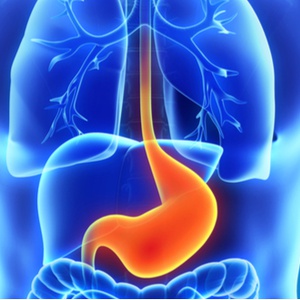When the cancer is larger, it can cause these symptoms:
- Blood in your stool or stools that are black in color
- A bloated feeling after eating, even when eating a small amount
- Vomiting after meals
- Unintended weight loss
- Stomach pain, especially after meals
- Weakness and fatigue
Many of these symptoms may be caused by conditions other than cancer. However, if you have any of these problems and they don’t go away, talk to your doctor. The earlier stomach cancer is found, the better the chances for effective treatment.
What causes stomach cancer?
Your chances of getting stomach cancer are higher if you have had a stomach infection caused by bacteria called Helicobacter pylori, which also causes ulcers in the stomach. You are also more likely to get stomach cancer if you:
- Are older than 50 years of age
- Have a close relative who has had stomach cancer
- Smoke cigarettes
- Abuse alcohol
- Are an African American, Hispanic American, Asian American or Pacific Islander
- Have stomach polyps (small growths in the lining of your stomach)
How is stomach cancer diagnosed?
If your doctor suspects that you might have stomach cancer, he or she will look at your medical history and do a complete physical exam. Your doctor might use endoscopy to try to see the tumor. For this exam, your doctor will place a thin, lighted tube into your mouth and pass down to your stomach. Your doctor may give you medicine before the test to make you more comfortable.
During endoscopy, your doctor might remove a small piece of your stomach to check it for cancer cells. This is called a biopsy sample. The sample is then sent to a lab where it is looked at under a microscope to determine if it is cancerous.

